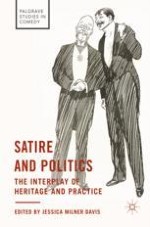2017 | OriginalPaper | Buchkapitel
4. The Politics of Deadpan in Australasian Satire
verfasst von : Nicholas Holm
Erschienen in: Satire and Politics
Aktivieren Sie unsere intelligente Suche, um passende Fachinhalte oder Patente zu finden.
Wählen Sie Textabschnitte aus um mit Künstlicher Intelligenz passenden Patente zu finden. powered by
Markieren Sie Textabschnitte, um KI-gestützt weitere passende Inhalte zu finden. powered by
